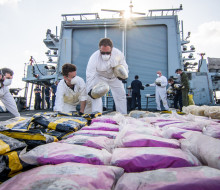
New Zealand to lead maritime drug interception team in Middle East and Indian Ocean
17 December 2024
Unfortunately you are viewing this website on an outdated browser which does not support the necessary features for us to provide an adequate experience. Please switch to a modern browser such as latest version of Google Chrome, Mozilla Firefox, Apple Safari or Microsoft Edge.
Ngā mihi nui
From 40-degree heat to civilian violence, personnel deployed to the United Nations Mission in South Sudan (UNMISS) say it’s an experience with many challenges.
Major Josh Sullivan and two other personnel are several months into their deployment as part of UNMISS. The United Nations has been present in the country since its independence in 2011.
The mission, which involves peacekeepers from 73 countries, has a strategic vision of preventing a return to civil war and enabling the self-reliance of South Sudan. It focuses on the protection of civilians, creating conditions conducive for the delivery of humanitarian assistance, supporting the implementation of the revitalized agreement and the peace process, and monitoring and investigating human rights.
Major Sullivan says the job is about as diverse as those assigned to it.
“New Zealand contributes three personnel, two United Nations Military Observers (UNMO) and one Force Headquarters staff officer,” he says.
“While no two days are the same, the role of the UNMO requires the planning and execution of patrols to get out on the ground and act as the eyes and the ears of the Force Commander, interacting regularly with the community, key leaders and the South Sudanese Defence and Police Forces.”
A key aspect that drives everyone in the UNMISS is the desire for a peaceful end to the humanitarian crisis in South Sudan.
Their current rotation is at an interesting time, with the country working towards its first democratic election.
“The situation is growing increasingly tense with distrust and mixed messages over the likelihood of election.
“There is increasing intercommunal violence between cattle herders and cattle raiders, and ever more common clashes between the key armed groups (both within and external from the government).
“In short, the situation is tense and from the outside looking in – it doesn’t seem like a safe and stable environment to be conducting elections in. But observations are always a matter of perception, and the communities we interact with say the situation is calm and stable.
“When you’re a nation that has been fraught with civil conflict and genocide while contending with mass famine and inadequate medical care, cattle raids probably do seem relatively peaceful.”
It doesn’t help that there is a national food shortage. Without access to a mess or dining facility, NZDF personnel also need to procure food too, in an increasingly food-scarce environment.
But despite the difficulties, the small NZDF contingent is enjoying the challenges.
“We’re representing New Zealand proudly and doing our best to have a positive impact. It’s safe to say that this operation is shaping up to be an experience like none of us have encountered before.”